Meet the State Exec: Ashley Rockwell Batson, Esquire
BY AsphaltPro Staff
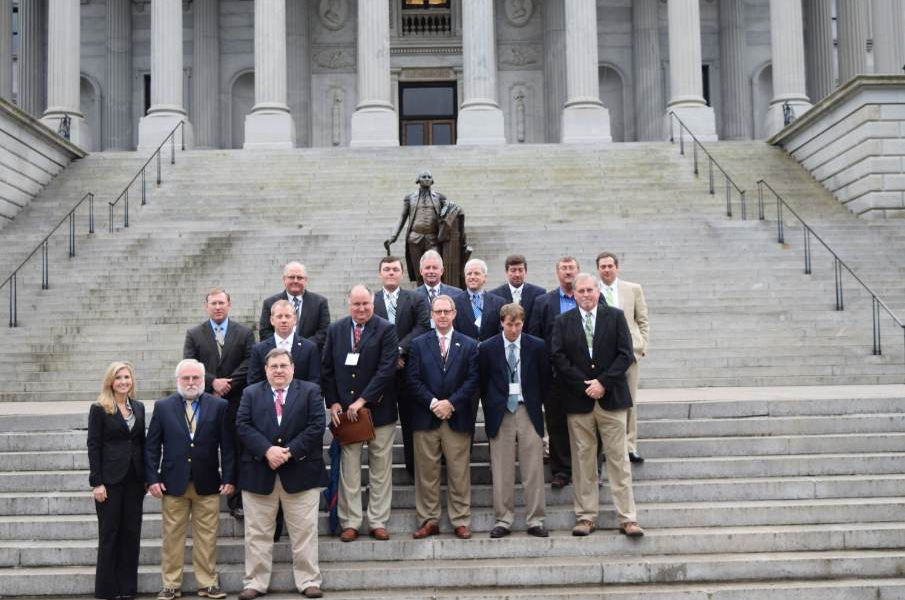

When the introduction of lifecycle cost analysis (LCCA) legislation was introduced in 2012, SCAPA took a proactive approach to advocacy and established a presence at the South Carolina General Assembly in order to protect the asphalt industry from harmful regulations. Since then the association has held a SCAPA Legislative Day each year.
State Association:
South Carolina Asphalt Pavement Association (SCAPA), Columbia, S.C.
How long have you been in the asphalt industry?
4 ½ years
Do you have a degree related to the industry?
No. I have a Bachelor of Arts in Communication Studies and Spanish from Clemson University and my Juris Doctor from the Charleston School of Law. My career with the asphalt industry began through my prior work in government affairs managing a trade association for the health insurance industry. SCAPA’s board of directors wanted to take the association in a different direction. What the SCAPA board of directors realized was that it needed an experienced association manager to come in and create a new strategic vision for the association, which had seen a drop in tons and membership dues as a result of the economic downturn. Since then, we have managed to increase revenue through new programs and events to help offset the loss of revenue.
Additionally, we’ve hired a technical director to serve as a technical resource for both our members and engineering professionals, as well as published an Asphalt Pavement Design Guide for Low Volume Roads and Parking Lots, conducted an Economic Impact Study of South Carolina’s Asphalt Paving Industry, launched a new website and social media programs, and become more involved in advocacy at both the state and federal level.
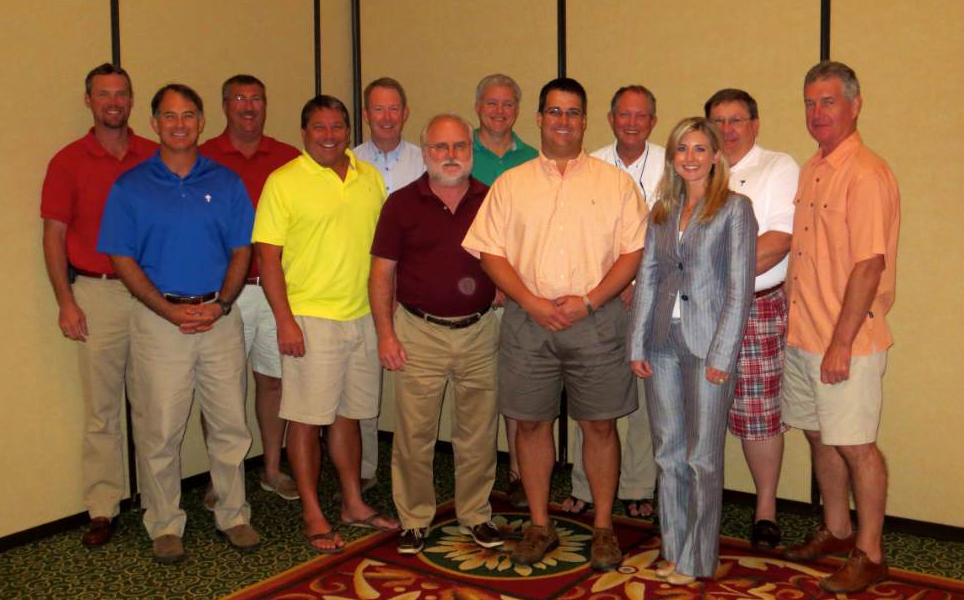
SCAPA Executive Director Ashley Rockwell Batson stands with the SCAPA board of directors.
How long have you been the executive director of your state association?
Approximately 4 ½ years
In what year was your state association formed?
1966
How many producer and/or contractor members are in your state association?
11 producer members; represents about 90 percent of the firms in the state
What are the top two or three ways you have increased membership in the association?
Increased Advocacy—Prior to my coming on board, SCAPA was not politically active as an association; rather the members were active individually or as part of other trade associations. Beginning in 2012, with the introduction of lifecycle cost analysis (LCCA) legislation, SCAPA took a proactive approach to advocacy and established a presence at the South Carolina General Assembly in order to protect our industry from harmful legislation and regulations. Since then we’ve held a SCAPA Legislative Day each year.
During the Legislative Day, SCAPA and its members go to the SC General Assembly to meet with our elected officials and educate them about the issues important to the asphalt paving industry. The SCAPA Legislative Day has helped to broaden awareness about the asphalt industry and the economic impact we make in the state of South Carolina.
Increased Membership Programs—In 2013, we initiated SCAPA Member Dinners, which are networking events catered to our producer and associate members. These dinners take place twice a year. We allow two associate members to sponsor each event. The sponsorship includes the opportunity to give a 20-minute presentation on a new technology or innovation to improve the asphalt industry.
Upper management of the producer member companies and our associate member representatives attend the dinners. We’ve received a lot of positive feedback from both our producer and associate members regarding these events. This has been a great recruiting tool as well for new associate members trying to introduce their products or services in South Carolina. Since 2013 we’ve increased our associate membership by 22 percent since its inception.
Increased Marketing & Education Efforts—In 2013, SCAPA began its Partners in Quality program with SCDOT. We borrowed this idea from the Texas Asphalt Pavement Association. The program is held in the winter at all seven SCDOT district offices in South Carolina. During the program, we discuss technical issues and best practices prior to the paving season. This has allowed SCAPA and its members to work outside of SCDOT headquarters and build relationships with agency officials at the local level.
We also present award certificates to the winning projects of the SCAPA Quality Pavement Awards that we announce annually at our SCAPA Winter Conference. Thanks to Harold Mullen and TxAPA for the great idea! Additionally, we hired a Technical Director in May 2014 to help us expand our marketing and education efforts. His responsibilities include increasing SCAPA’s presence at industry tradeshows and speaking roles at industry conferences and meetings.

Whether she’s representing the industry at the state highway transportation officials tradeshow booth, presenting facts about asphalt paving or visiting with members of the board at the summer conferences, SCAPA Executive Director Ashley Rockwell Batson has multiple projects to juggle on a regular basis. That’s how she and the technical director have moved the association into scoring position for the asphalt industry.
What is your favorite method for recruiting new asphalt professionals to the industry in general?
In 2011 SCAPA contributed $100,000.00 from our Marketing and Education Fund to Tri-County Technical College to invest in their asphalt research lab. This enabled Tri-County Tech to conduct research projects for SCDOT, as well as coordinate and run the SCDOT Certification Program. The school is also working to create a civil engineering associate degree program. Additionally, we developed SCAPA Internship Program to help recruit engineering and construction majors to obtain experience in the asphalt paving industry.
In what month do you hold your annual meeting?
We have two conferences a year; our annual meeting is in July and our winter conference is in February. We hold our tradeshow during the SCAPA winter conference.
Do you have a staff that assists in preparing the annual meeting?
Yes, we handle all SCAPA events.
Does your staff hold educational seminars or webinars for members separate from the annual meeting/convention(s) throughout the year?
Yes, since the launch of our Asphalt Pavement Design Guide, we’ve held seminars to educate both our members and design professionals. We are working to expand our educational arm of the association to develop more seminars for members and design professionals on a wide array of topics.
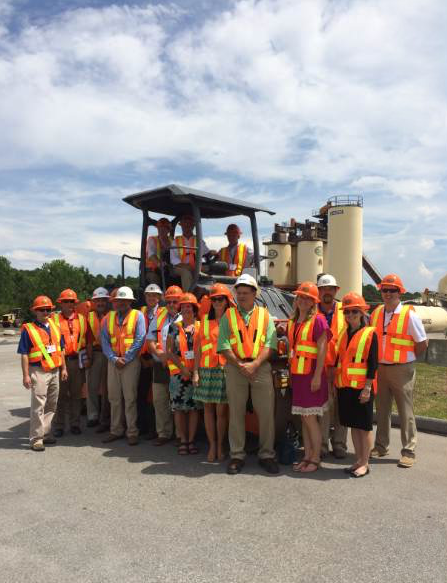
In August 2014, SCAPA Executive Director Ashley Rockwell Batson participated in the Duncan asphalt plant tour.
About how many member asphalt projects do you visit per year/paving season?
Not as many as I’d like to visit, but at least two a year. I do get out to visit each of our members at their offices each year. Our technical director’s job is to visit member projects in order to provide technical assistance. He visits at least 15+ projects per year.
About how many member asphalt plant tours do you assist/are you a part of per year?
At least two to three plant tours a year
About how many state agency or DOT meetings do you attend per year?
20+
On a scale of 1 to 5 (1 being none at all; 5 being very much), how much of a threat to your members’ marketshare/livelihood is the concrete industry in your state?
5
Could you share an example/anecdote of a time when the concrete industry encroached on the asphalt marketplace in your state?
In South Carolina, the cement industry has made large strides in the area of full depth reclamation with cement for rehabilitation of roads. Not only has this virtually eliminated black base in South Carolina, but it also has caused our RAP supplies to greatly diminish.
We have also seen the introduction of life cycle cost analysis legislation before the SC General Assembly which mirrors the same legislation the PCA is pushing in other states and at the federal level.
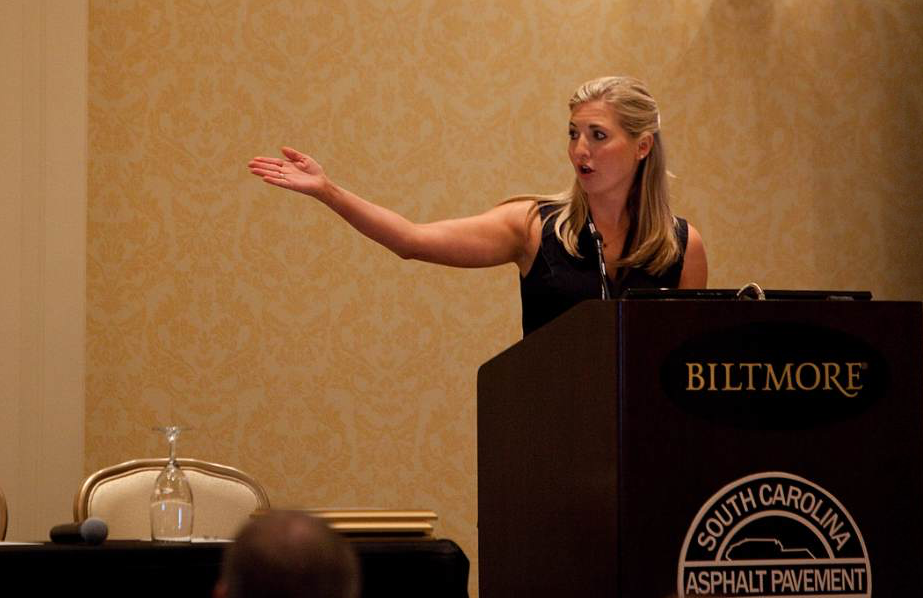
On a scale of 1 to 5, how much difficulty are your members having in finding qualified workers for their asphalt paving or production crews?
5
Could you give an example (or two) of a way your state APA assists members with workforce development?
Finding and keeping a skilled workforce is a huge challenge for the asphalt industry. SCAPA has worked to tackle our workforce development issues head on over the past four years. In addition to both our investment in TCT’s asphalt research lab and the SCAPA internship program, we are actively involved in a Heavy Highway Construction Industry Workforce task group with the SC Department of Employment and Workforce, and several other statewide agencies. The goal of the task group is to attract job seekers to the heavy highway construction industry and match these potential employees with our member companies. The SC Technical College system is also an integral part of this task force so that we can ensure proper training programs are in place to help these new employees get the right training to be able to perform the work required.
On a scale of 1 to 5, how involved are your state elected officials in transportation issues such as funding and infrastructure improvements?
5
On a scale of 1 to 5, how involved are your asphalt members in transportation issues such as funding and infrastructure improvements?
5
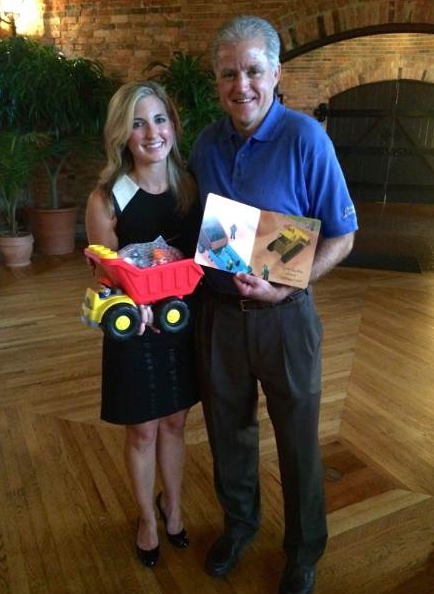
Could you share an example of a time when your state APA hosted elected officials to educate them?
This past October SCAPA hosted Congressman Jim Clyburn at one of its members’ asphalt plants in Orangeburg, S.C. During this plant visit and tour, we discussed both the funding and workforce development needs in our industry, as well as educated him about the asphalt pavement industry.
Get to Know Ashley Rockwell Batson
Why (or how) did you join the asphalt industry?
I decided to join the asphalt industry after meeting the SCAPA board of directors. These are 11 of the finest men I’ve had the privilege of working with over the past four years. They work hard daily to do good work, provide jobs, and support their families and the families of their employees. Their work ethic and passion for this industry compelled me to take the job and help lead their association.
What do you see as the most important part of your job as an executive director of a SAPA?
I view myself as the quarterback of an incredible team. My job is to keep the ball moving forward toward the end goal line. Once we get there, we start over with reviewing our strategic goals and vision, and move ahead again with our new initiatives. Without the dedicated members in SCAPA, we would not be able to carry out these goals for the asphalt paving industry in South Carolina.
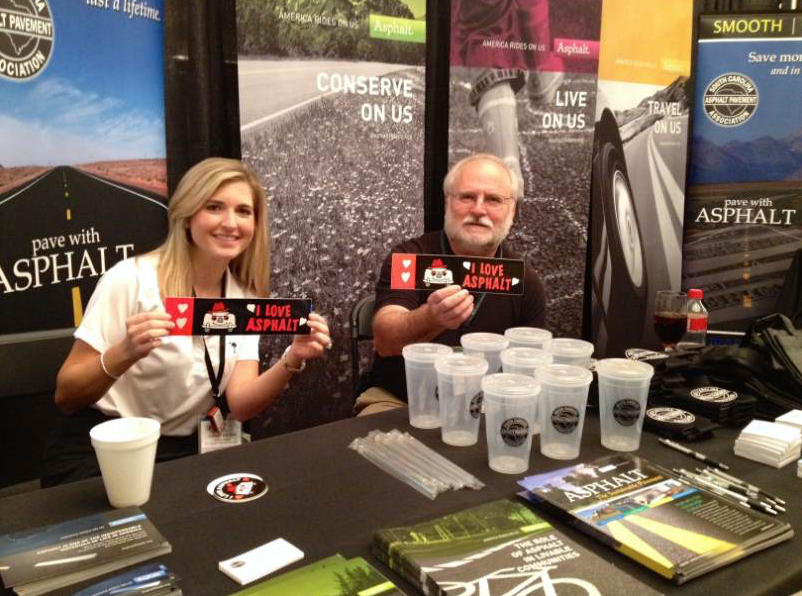
What is the most challenging part of your job, and why do you think it’s a challenge in your state (or in this economy or in this industry, etc.)?
The most challenging part of my job is keeping all of the balls in the air at the same time. This can require some skillful juggling. In this tough economy, we are working with a small staff of two—our technical director and me. We continue to grow our programs and initiatives, yet try and keep overhead low. It can be challenging at times to tackle all of these objectives at once, but fortunately we can rely on our membership committees to help us prioritize our goals and keep the train moving forward.
What has been the most rewarding experience for you during your time as the executive director?
Association work is the best. I love meeting new people and educating them about the greatness of the asphalt paving industry, whether it be our elected officials, agency leaders or the general public. I love spending time with SCAPA members at our events and recruiting new members to join SCAPA as well. Additionally, I love helping the industry partner with our state officials to build and maintain quality roads in the state of South Carolina. I’m so proud to be the executive director of SCAPA, and hope to continue in this role for a long time.
